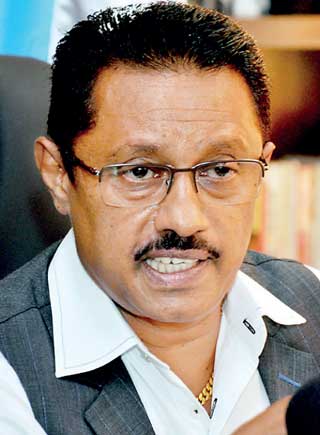Thursday Feb 19, 2026
Thursday Feb 19, 2026
Monday, 2 January 2023 00:00 - - {{hitsCtrl.values.hits}}

By Charumini De Silva
 |
| PUCSL Chairman Janaka Ratnayake
|
Regulatory body PUCSL yesterday claimed that the proposed electricity tariff hike is unaffordable hence will not be approved and urged the public not to panic unnecessarily and the Government to look for alternatives.
“There will be no electricity tariff hike this month, as speculated by everyone. The tariff hike announced on 10 August last year is sufficient and the Ceylon Electricity Board is already making an operational profit. Hence, electricity users need not panic unnecessarily,” Public Utilities Commission of Sri Lanka Chairman Janaka Ratnayake told journalists yesterday. Last week, Power and Energy Minister Kanchana Wijesekera asserted that a proposal to increase electricity tariff will be presented to the Cabinet of Ministers at its first meeting scheduled for today.
PUCSL Chief claimed that the CEB is trying to pass another electricity tariff hike through the Cabinet of Ministers despite the overall average tariff hike of 75% implemented on 10 August 2022.
“They (CEB) are looking at another 75% tariff hike,” he added.
“The Government is trying to earn over Rs. 160 billion from grassroot level poor who use less than 90 units per month. This is against any income generation norms,” opined Ratnayake.
He said the strange fact of this proposal is that the CEB is trying to increase the tariff of the low-user category, which accounts for about five million electricity users who take up below 90 units per month.
“This category is currently billed at Rs. 8, Rs. 12 and Rs. 16 – but as per the proposed Cabinet paper, they are trying to increase it up to Rs. 32, Rs. 37, and Rs. 42 which is almost 300% tariff increase to this lower-user category,” he revealed.
The PUCSL Chief also noted that with the previous tariff hike, the usage of electricity has dropped by 15%.
“It is beyond unethical to increase higher tariffs from the low-users to ensure supply to the high-users. In an economy which is predicted to contract this year, it is not correct to estimate a higher electricity demand.
If the electricity tariff is hiked to this low-usage category, I believe it is not economically possible to bear the huge monthly bill,” he added.
“Before 10 August, CEB generated an income of Rs. 220 billion, whilst the post-tariff hike in 2022, the CEB’s income increased to Rs. 493 billion. For this year they are planning an income of Rs. 777 billion and Rs. 100 billion of that from lower electricity users. It is unfair by the CEB to charge higher from this category because the benefits of hydropower generation must be passed on to the electricity users,” he said.
Ratnayake also revealed that around 5,500 GWh have been generated via hydropower, whilst 3,500 GWh of it is being utilised by the below 120-unit category. Generating a single unit with naphtha or furnace oil cost about Rs. 120 per unit compared to hydroelectricity of below Rs. 3 per unit.
“Hydropower is an essential source of power generation and the benefit of it must be passed on to the customers,” he added.
Noting that the proposed electricity tariff hike is likely to increase the industrial category including tourist hotels by 150% Ratnayake said it will deteriorate the crisis-hit economic activities further.
He also said the proposed electricity tariff hike may be based on the wrong recommendation that the Cabinet of Ministers can bypass the PUCSL Act and decide tariffs under the General Policy Guidelines.
“We think there are certain provisions in the PUCSL Act and therefore we will wait for the correct proposal to come from the CEB for us to consider because the Commission is the authorised institute to advise the Government on electricity-related issues,” he added.
When asked about the fact that the proposed hike has been approved by the Attorney General’s Department, Ratnayake said the Tariff Policy is not included in the General Policy.
“As per the PUCSL Act, General Policy can only adjust the tariffs related to the recovery of the cost. General Policy Guidelines have no provisions in the PUCSL Act on how to finance fuel and coal or to hike tariffs. I think they are trying to do this tariff hike by interpreting the provisions of the PUCSL Act,” he stressed.
Ratnayake still hopes the CEB will follow the correct procedure by requesting the PUCSL and stakeholder and public consultations.